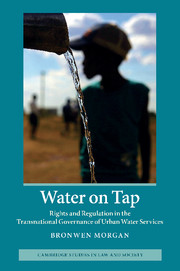Book contents
- Frontmatter
- Contents
- List of figures
- List of tables
- Acknowledgements
- Introduction: The field of global water policy: struggles over redistribution and recognition
- 1 Rights, regulation and disputing: a conflict-centred approach to transnational governance
- 2 Managed liberalisation and the dual face of French water services provision
- 3 ‘Another world is possible’: Bolivia and the emergence of a participatory public provision model for access to urban water services
- 4 Regulatory arbitrage and popcorn politics: contrasting disputing pathways in Argentina and Chile
- 5 Moonlight plumbers in comparative perspective: electoral v. constitutional politics of access to water in South Africa and New Zealand
- 6 Law's work: legality and identity in transnational spaces
- Epilogue
- References
- Index
- CAMBRIDGE STUDIES IN LAW AND SOCIETY
6 - Law's work: legality and identity in transnational spaces
Published online by Cambridge University Press: 03 May 2011
- Frontmatter
- Contents
- List of figures
- List of tables
- Acknowledgements
- Introduction: The field of global water policy: struggles over redistribution and recognition
- 1 Rights, regulation and disputing: a conflict-centred approach to transnational governance
- 2 Managed liberalisation and the dual face of French water services provision
- 3 ‘Another world is possible’: Bolivia and the emergence of a participatory public provision model for access to urban water services
- 4 Regulatory arbitrage and popcorn politics: contrasting disputing pathways in Argentina and Chile
- 5 Moonlight plumbers in comparative perspective: electoral v. constitutional politics of access to water in South Africa and New Zealand
- 6 Law's work: legality and identity in transnational spaces
- Epilogue
- References
- Index
- CAMBRIDGE STUDIES IN LAW AND SOCIETY
Summary
Introduction
The previous chapters located their narratives of struggles over access to water in national domestic settings. They focused on particular disputes in specific urban localities that brought together a wide range of organisations, actors and rules from different levels of governance. This made it possible to locate understandings of rights and regulation in these narratives as embedded in local political and institutional forces, as well as in the material specificity of particular urban settings. Thus, for example, although rights were important in both Bolivia and South Africa, the importance of social movement activists from rural areas in the Bolivian case study meant that conceptions of water as territory figured much more prominently than the South African township activism, which configured access to water as a basic service right.
In this final chapter, I work across the case studies, in a space that is at least partly deterritorialised and transnational. The space was constructed by exploring the perspectives of three interpretive communities across case studies: NGOs and activists, water companies and operators, and regulators (understood broadly to encompass civil servants, independent agencies and international financial institutions). Each of these three interpretive communities was embedded in networks and practices that, up to a point, either transcend or operate with little reference to national political processes and institutions. I then explored these groups' understandings of the meaning and utility of law, working with a communicative and systemic conception of law as encompassing institutions, rules and processes that defined conduct as legal or illegal.
- Type
- Chapter
- Information
- Water on TapRights and Regulation in the Transnational Governance of Urban Water Services, pp. 172 - 200Publisher: Cambridge University PressPrint publication year: 2011



